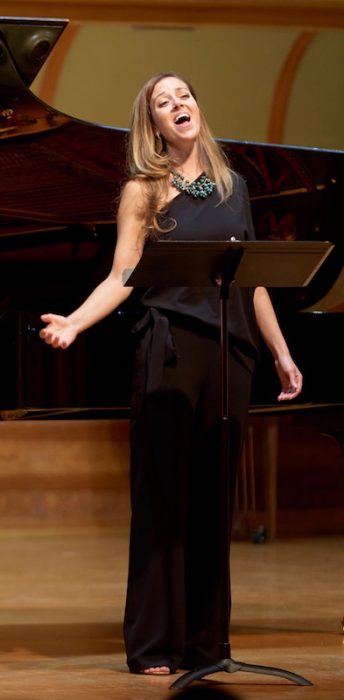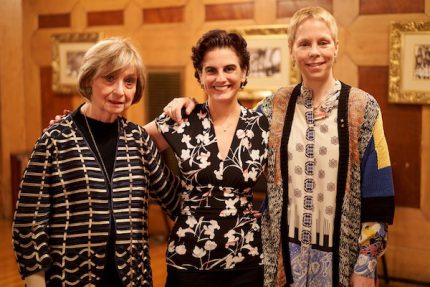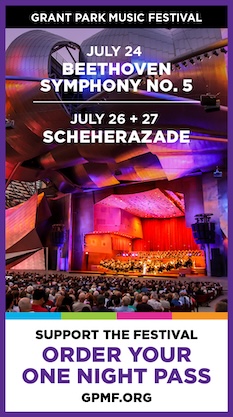Collaborative Works Festival opens with bracing music by Chicago women

The Collaborative Works Festival has been bringing first-class performances of art song to local audiences since 2011, as the main public event of the Collaborative Arts Institute of Chicago.
The 2019 CWF installment marks the fall festival’s most ambitious lineup to date. All three programs this year are made up entirely of music by living composers. Thursday night’s opening program (“The City”) offered art songs by Chicago-based women composers, with the ensuing weekend concerts expanding to a broader American program (“The Nation”) and a finale with music by international composers (“The World”).
“This is brand new territory,” said CAIC co-founder Nicholas Phan in his introduction. The tenor noted that nearly all of the music was being performed for the first time by himself and his colleagues: soprano Lauren Snouffer, countertenor Anthony Roth Costanzo, and pianists Lisa Kaplan and John Arida. Along with one world premiere, several songs were being debuted in new versions for different voice types.
The only quibble about this enterprising program was that it centered a bit too much on the most prominent and well-connected figures on the local scene. Also, with Stacy Garrop the youngest composer represented at 49, it would have been a nice gesture to include an item or two by a younger generation of talented local women composers—people like Liza Sobel or Amy Wurtz.
That apart, the stylistic mix of songs was bracing—if inevitably varied in inspiration—and the performances were consistently polished and impassioned, making for a rewarding opener to this year’s series.
Music of Stacy Garrop framed the 90-minute, interval-less program. Countertenor Costanzo opened the evening with “Smile O voluptuous cool-breathed earth!”, an excerpt from Garrop’s environmentally minded oratorio, Terra Nostra. Costanzo’s high, rich timbre and full-blooded vocalism brought out the unsettling qualities of the Whitman setting.
Also heard was Garrop’s “My Dearest Ruth,” a setting of a farewell note from Martin Ginsburg written in the hospital to his wife Supreme Court justice Ruth Bader Ginsburg. Though Garrop’s setting gets a bit overwrought in the middle for the touching simplicity of the dying Ginsburg’s unadorned leave-taking, Phan brought out the letter’s vein of understated (and unstated) feeling.
Garrop’s “Dirge Without Music” closed the evening. There is little sense of going gently into the dark night in this setting of Edna St. Vincent Millay’s poem, though the progression of the text is charted with great compositional skill. Soprano Snouffer’s sensitive yet powerful performance showed Garrop’s art at its finest.

Still active at 82, Lita Grier was the most veteran of the four composers represented (with Augusta Read Thomas and Garrop, Grier was also in attendance Thursday night). At its best, Grier’s music has a natural lyricism and directness of expression that make some of the works on the program sound fussy and studied by comparison.
Such was surely the case in Women’s Lives and Loves, a repurposed suite of the “women’s songs” from Grier’s larger cycle Songs from Spoon River. The cycle takes its texts from the 244 fictional epitaphs that make up Edgar Lee Master’s Spoon River Anthology.
Snouffer conveyed the widely ranging expression of these five valedictory snapshots, from the stoic expression of “Sarah Brown” to the mordant irony of “Margaret Fuller Slack” (“Sex is the curse of life!”) and postmortem desperation of “Rita Matlock Gruenberg.” Snouffer’s bright soprano occasionally turned strident at full volume but she handled the leaping top notes and expressive demands of Grier’s music with impressive facility and emotional commitment.
Grier’s two songs from the Billy Collins Suite proved just as striking. In these meditations on loss for voice, piano and clarinet, Phan’s plangent tone and intimate style conveyed the story-telling quality of these lovely settings.
Thomas’s “Your Kiss” was heard in its world premiere. Dedicated to and written for Phan, the tenor brought total involvement to this setting of e.e. cummings’ stanzas, with some gorgeous mezzo-voce shading. Unfortunately, Thomas’s music was unconvincing, veering from static to hectoring and missing the simple painterly flow of cummings’ words.
Costanzo handled the relentlessly busy vocal line of Thomas’s “Twilight Butterfly” with aplomb and full-throated facility. Yet here too, compositional method and technical complexities overwhelm the delicacy of the poetry. “Among Dawn Flowers” (also sung by Costanzo) emerged better, with Thomas’s alternation of widely spaced words and agitation better reflecting Basho’s elliptical text.
Snouffer was also heard to fine effect in Shulamit Ran’s atmospheric “Love’s Call,” bringing some lovely soft singing to Charles Kondek’s adaptation of verses from the Song of Songs.
Like their vocal colleagues, pianists Kaplan and Arida brought equally committed and big-boned support throughout the program (joined by clarinetist Samuel Almaguer in the Billy Collins songs). Fortissimos, from singers and instrumentalists alike, were sometimes overwhelming in the very live room and the volume could have been taken down a notch or two with no loss of dramatic impact.
The Collaborative Works Festival continues with “The Nation” 7 p.m. Saturday at the Poetry Center, 61 W. Superior. The program of American composers includes music of Nico Muhly, Caroline Shaw, Sarah Kirkland Snider, Gabriela Lena Frank, Jake Heggie and Ned Rorem. caichicago.org
Posted in Performances
